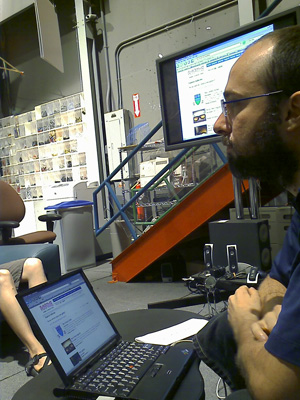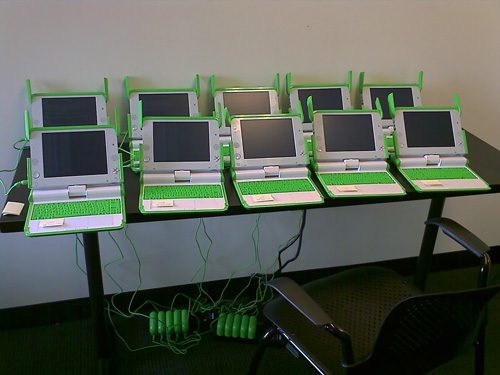We’ll never thank Chintan Vaishnav enough for arranging our visit to the MIT Media Lab and OLPC Foundation, impressive places where to work (or study, of course: actually, a place to learn, either official role you get there with), really interdisciplinary.
MIT Media Lab
We visited Lifelong Kindergarden research group, which has Lego as main founder, and Lego Mindstorms as one of Lego-MIT Media Lab most interesting outcomes.

Jay Silver
We there were presented a couple of very interesting projects:
Scratch
Jay Silver kindly introduced us to the rudiments of Scratch and how to get started on this tool. Actually, I still wonder whether it is a game, a multimedia design and production tool, an educational technology, a collaborative web 2.0 networking social software or all of them.
I’m pretty sure that Jay Silver was right when he said that tools the like of Scratch actually fit on what Ivan Illich wanted to state on Deschooling Society.
What’s Up
It then was turn for Leo Burd’s thesis Technological Initiatives for Social Empowerment: Design Experiments in Technology-Supported Youth Participation and Local Civic Engagement, most commonly known as What’s Up.
The project joins best of both worlds in VoIP, mobile telephony and social software for community building. The idea is that while the Web is quite spread, in most developing countries the ICT revolution is clearly led by mobile phones. Thus, What’s Up presents the usual community site but empowered with VoIP and all kinds of mobile enhanced features, just like SMS posted text and vodcasts.
One Laptop per Child Foundation

XO Laptop (AKA “OLPC” Laptop)
It is actually relevant that our visit at One Laptop per Child Foundation was lead by Samuel Klein, director of content of the One Laptop per Child Project.
A year and a half ago I wrote Negroponte and the Web 2.0 or the Four Classes of the Digital Divide to state that Nicholas Negroponte’s effort to bridge the digital divide will be worthless if digital literacy and provision of content and services did not accompany the infrastructures revolution and diffusion. Having Samuel Klein as spokesman or PR representative makes a tacit statement on what the One Laptop per Child Project is about: it is not about delivering laptops to children, is about opening them the gates of content, which is the real issue.
As he himself explained, every activity has comunity around it, being the goal to build education networks, an example of it the installation of Moodle for some community projects, being the management and coordination of this free software LMS done by the same educational institutions that provide wireless connectivity to the laptops.
The commitment with content can be on the other hand exemplified with the Summer of Content 2007 initiative to provide content to be packeted with the XO laptop.
Samuel Klein strongly encouraged the audience and anyone interested to both contribute to the OLPC Project Wiki and subscribe to the OLPC Project Wiki mailing lists.
More info
- MIT: Media Lab, Stata Center, Press, by Daithí Mac Síthigh
- MIT: One Laptop Per Child, by Daisy Pignetti
- ‘$100 laptop’ production begins
SDP 2007 related posts (2007)
If you need to cite this article in a formal way (i.e. for bibliographical purposes) I dare suggest:
Peña-López, I. (2007) “OII SDP 2007 (Break): Visit to the MIT Media Lab and One Laptop per Child Foundation” In ICTlogy,
#46, July 2007. Barcelona: ICTlogy.
Retrieved month dd, yyyy from
https://ictlogy.net/review/?p=583
Previous post: OII SDP 2007 (XVI): Obama Girl Confronts the Future: New Media Literacies, Civic Engagement, and Participatory Culture
Next post: OII SDP 2007 (XVIII): Making the Tragedy of the Commons into a Comedy
2 Comments to “OII SDP 2007 (Break): Visit to the MIT Media Lab and One Laptop per Child Foundation” »
 RSS feed for comments on this post.
TrackBack URI
RSS feed for comments on this post.
TrackBack URI


Hi
It was great to get to discuss these issues with you and the other students. I just wanted to comment on a few things. I think I try to use Illich’s dream as an inspiration, but I don’t know that we’ve gotten there. Lego is a big funder of the Media Lab as a whole and a close collaborator with our group. Out of that collaboration (between our group, LLK, and Lego) Lego Mindstorms is probably one of the biggest results.
Thanks again for visiting and for blogging the event.
Thanks Jay for the great time there and your warmth in showing us everything. And yes, I maybe polarized your comment on Illich ;)